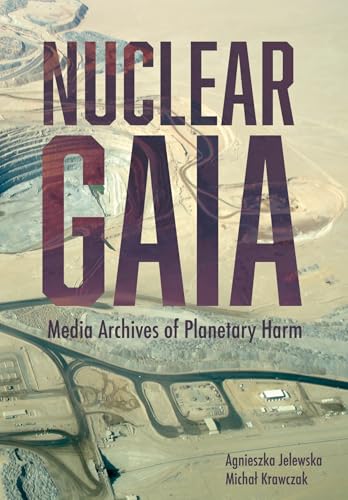Compelling work explores the intersections of ecology, media, technology, and global environmental crises, offering a critical examination of how nuclear histories and planetary harm are documented, communicated, and culturally interpreted. Jelewska investigates the ways media archives shape our understanding of ecological damage, environmental responsibility, and the long-term effects of human activity on Earth’s systems.
Through a multidisciplinary lens, the book provides valuable insights into cultural narratives, scientific discourse, and the mediated visual and textual records that influence contemporary environmental awareness. Readers interested in media studies, cultural research, and ecological theory will find this downloadable PDF/EPUB edition an essential and thought-provoking resource.
Brief Summary of Book: Nuclear Gaia: Media Archives of Planetary Harm (BCMCR New Directions in Media and Cultural Research) by Agnieszka Jelewska
Below is a brief description and cover image of Nuclear Gaia: Media Archives of Planetary Harm (BCMCR New Directions in Media and Cultural Research) by Agnieszka Jelewska, published on November 21, 2025. You can review this overview before accessing the full PDF/EPUB download at the bottom.
This book explores the profound transformations brought about by the advancement of nuclear science and technology, the acceleration of energy-dependent policies, and military strategies that together support the provocative assertion that Earth is increasingly resembling what the authors term “Nuclear Gaia.”
It investigates media archives and digital platforms that preserve data, memory, and collective awareness of nuclear events from both the distant and recent past. These materials highlight the emergence of new forms of social justice driven by open-source investigation (OSINT) groups, independent researchers, artists, activists, media creators, local communities, and civic organizations.
As a result, the analysis of nuclear processes and their social and environmental impacts is no longer confined to experts, politicians, or military authorities.
The authors argue that these community-driven practices, combined with decolonial perspectives and post-nuclear media studies methodologies, can empower affected populations by creating media spaces where discussions of harm, responsibility, and justice can lead to meaningful change in how nuclear energy is understood and governed—past, present, and future.
Nuclear Gaia: Media Archives of Planetary Harm (BCMCR New Directions in Media and Cultural Research) by Agnieszka Jelewska – eBook Details
Before downloading the complete PDF or EPUB of Nuclear Gaia: Media Archives of Planetary Harm (BCMCR New Directions in Media and Cultural Research) by Agnieszka Jelewska, you can review the technical details of the eBook below:
- Full Book Title: Nuclear Gaia: Media Archives of Planetary Harm (BCMCR New Directions in Media and Cultural Research)
Author: Agnieszka Jelewska
Genre: Non-Fiction, History
Series: —
ISBN: 9781835951538
ASIN: 1835951538
Language: English
Publication Date: November 21, 2025 - File Information:
- PDF Filename: Nuclear_Gaia_Archives_of_Planetary_Harm_-_Agnieszka_Jelewska.pdf
- EPUB Filename: Nuclear_Gaia_Archives_of_Planetary_Harm_-_Agnieszka_Jelewska.epub
- PDF Size: 9.1 MB
- EPUB Size: 8.6 MB
Frequently Asked Questions
What is the central focus of Nuclear Gaia: Media Archives of Planetary Harm?
The book examines how nuclear science, technology, and media archives shape our understanding of environmental harm, global risk, and collective memory.
Why is the term “Nuclear Gaia” used?
“Nuclear Gaia” is a conceptual framework suggesting that Earth’s systems and human nuclear activities have become increasingly intertwined, affecting the planet on ecological, social, and cultural levels.
What types of sources does the book analyze?
The authors explore media archives, digital platforms, open-source investigations (OSINT), and community-generated documentation of nuclear events.
Who contributes to modern nuclear knowledge and accountability?
Independent researchers, activists, artists, community groups, and OSINT teams now play key roles alongside scientists, policymakers, and institutions.
How does the book address social and environmental justice?
It highlights how community-led documentation and decolonial practices can reshape public discourse, support affected populations, and advocate for fairer approaches to nuclear energy and its consequences.
Conclusion
Nuclear Gaia: Media Archives of Planetary Harm presents a compelling exploration of how nuclear science, technological systems, and media archives intersect to shape our collective understanding of environmental and social realities. By examining historical and contemporary nuclear events through diverse forms of documentation—from institutional records to community-driven investigations—the book demonstrates how knowledge production is shifting beyond traditional authorities. It highlights the growing influence of open-source researchers, activists, artists, and local communities in revealing concealed truths, reclaiming memory, and advocating for justice.
Nuclear Gaia: Media Archives of Planetary Harm (BCMCR New Directions in Media and Cultural Research) Download
If you are still looking for a free PDF or EPUB of Nuclear Gaia: Media Archives of Planetary Harm (BCMCR New Directions in Media and Cultural Research) by Agnieszka Jelewska, simply use the buttons below to begin your download. You can access the complete soft copy of the book in PDF or EPUB format without registration.


